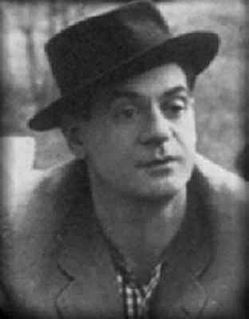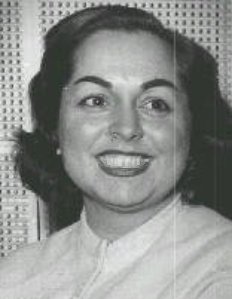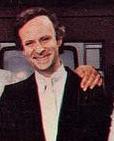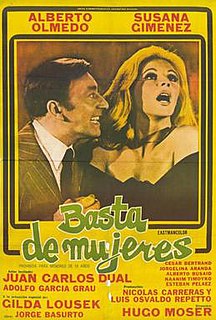Life and work
Juan Carlos Mesa was born in Córdoba, Argentina, in 1930. Following a stint as a writer in Uruguay for a sitcom, Telecataplum, He began his career in Argentine television in 1967 as a junior writer for comedian Carlos Balá and first collaborated on a film script in 1971, with Enrique Carreras' family comedy, El veraneo de los Campanelli . He was reunited with Carreras for the film's 1972 sequel, wrote later that year for Fernando Siro in his picaresque comedy, Autocine mon amour, and in 1976, earned his first credit as lead writer in Palito Ortega's Dos locos en el aire. [1]

Córdoba is a city in the geographic center of Argentina, in the foothills of the Sierras Chicas on the Suquía River, about 700 km (435 mi) northwest of the Buenos Aires. It is the capital of Córdoba Province and the second most populous city in Argentina after Buenos Aires, with about 1,330,023 inhabitants according to the 2010 census. It was founded on 6 July 1573 by Jerónimo Luis de Cabrera, who named it after Córdoba, Spain. It was one of the first Spanish colonial capitals of the region that is now Argentina. The National University of Córdoba is the oldest university of the country and the seventh to be inaugurated in Spanish America. It was founded in 1613 by the Jesuit Order. Because of this, Córdoba earned the nickname La Docta.

Uruguay, officially the Oriental Republic of Uruguay, is a country in the southeastern region of South America. It borders Argentina to its west and Brazil to its north and east, with the Río de la Plata to the south and the Atlantic Ocean to the southeast. Uruguay is home to an estimated 3.44 million people, of whom 1.8 million live in the metropolitan area of its capital and largest city, Montevideo. With an area of approximately 176,000 square kilometres (68,000 sq mi), Uruguay is geographically the second-smallest nation in South America, after Suriname.
A sitcom, clipping for situational comedy, is a genre of comedy centered on a fixed set of characters who carry over from episode to episode. Sitcoms can be contrasted with sketch comedy, where a troupe may use new characters in each sketch, and stand-up comedy, where a comedian tells jokes and stories to an audience. Sitcoms originated in radio, but today are found mostly on television as one of its dominant narrative forms. This form can also include mockumentaries.
Writing for leading local television comic Tato Bores in 1980, Mesa first became widely known as a performer on the radio, rather than on the screen, with his popular Radio Mitre show, Tenis de mesa; the name of the show ("table tennis") was a play on his own last name, a witticism that became part of his act on many of his subsequent productions. [2] Perhaps the most successful of these was Mesa de noticias ("News Desk"). The primetime sitcom, which premiered in 1983, set Mesa in a struggling network news program as its hapless programming director, and ran until 1987, appealing to audiences of an unusually varied demographic. [3] His leading co-star, Italian actor Gianni Lunadei, joined Mesa in 1991 for a less successful spin-off, El gordo y el flaco (akin to Laurel and Hardy). [1]

Mauricio Borensztein, known by the stage name Tato Bores, was an Argentine film, theatre and television comedian, who specialized in political humor. His ironic TV monologues, delivered at a fast pace, became a reference point for generations of Argentines.

Table tennis, also known as ping-pong, is a sport in which two or four players hit a lightweight ball back and forth across a table using small rackets. The game takes place on a hard table divided by a net. Except for the initial serve, the rules are generally as follows: players must allow a ball played toward them to bounce one time on their side of the table, and must return it so that it bounces on the opposite side at least once. A point is scored when a player fails to return the ball within the rules. Play is fast and demands quick reactions. Spinning the ball alters its trajectory and limits an opponent's options, giving the hitter a great advantage.
News broadcasting is the medium of broadcasting of various news events and other information via television, radio, or internet in the field of broadcast journalism. The content is usually either produced locally in a radio studio or television studio newsroom, or by a broadcast network. It may also include additional material such as sports coverage weather forecasts, traffic reports, commentary, and other material that the broadcaster feels is relevant to their audience.
Mesa continued to write for cinema, as well, working with the best-known local comedy duo of the 1980s, Alberto Olmedo and Jorge Porcel (whose wiry and portly physiques, respectively, mirrored those of Lunadei and Mesa, somewhat). His script for the boot camp comedy Los colimbas se divierten (1986) was followed by the Olmedo-Porcel duo's last, the 1988 gender-bender Atracción peculiar . [1]

Alberto Olmedo was an Argentine comedian and actor, popularly regarded as one of the most important comedians in the history of his country, for his outstanding work in television, cinema and theater.
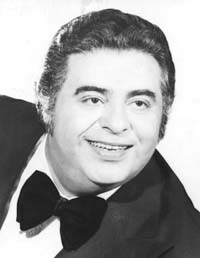
Jorge Raúl Porcel de Peralta, known as Jorge Porcel, was an Argentine comedy actor and television host. He was nicknamed El Gordo de América. Porcel is considered, along with Alberto Olmedo, one of Argentina's greatest comic actors of the twentieth century.
Following Alberto Olmedo's death in 1988, and Porcel's departure for Miami Beach, Mesa's career declined somewhat. Appearing mainly on radio, he worked with his brother Edgardo and son, Juan Martín, in El Surtidor ("The Dispenser"), a variety show complete with astrology forecasts. [3] He reemerged on television, however, as the chief writer and in a supporting role in a 2003 sitcom, Dr. Amor (played by Arturo Puig, who had become well-known among younger audiences in the United States in the PBS educational series, Destinos ). He returned Radio Mire in 2006 with a segment, Río con Mesa, on Lalo Mir's top-rated Animados, [2] and portrayed Noah in a voice-over role for an award-winning 2007 animated film, El arca ("The Ark"). [1]
Variety shows, also known as variety arts or variety entertainment, is entertainment made up of a variety of acts including musical performances, sketch comedy, magic, acrobatics, juggling, and ventriloquism. It is normally introduced by a compère or host. The variety format made its way from Victorian era stage to radio and then television. Variety shows were a staple of anglophone television from the late 1940s into the 1980s.

Astrology is a pseudoscience that claims to divine information about human affairs and terrestrial events by studying the movements and relative positions of celestial objects. Astrology has been dated to at least the 2nd millennium BCE, and has its roots in calendrical systems used to predict seasonal shifts and to interpret celestial cycles as signs of divine communications. Many cultures have attached importance to astronomical events, and some—such as the Hindus, Chinese, and the Maya—developed elaborate systems for predicting terrestrial events from celestial observations. Western astrology, one of the oldest astrological systems still in use, can trace its roots to 19th–17th century BCE Mesopotamia, from which it spread to Ancient Greece, Rome, the Arab world and eventually Central and Western Europe. Contemporary Western astrology is often associated with systems of horoscopes that purport to explain aspects of a person's personality and predict significant events in their lives based on the positions of celestial objects; the majority of professional astrologers rely on such systems.
Arturo Puig is an Argentine theatre, television and motion picture actor. He has worked in the 1990s success Grande, pá!!!
He died on 2 August 2016 at the age of 86. [4]
Screenwriting (film)
Dos locos en el aire is a 1976 Argentine film.

Brigada en acción is a 1977 Argentine comedy film directed by and starring Palito Ortega and written by Juan Carlos Mesa. The film premiered in Argentina on 21 July 1977.
This page is based on this
Wikipedia article Text is available under the
CC BY-SA 4.0 license; additional terms may apply.
Images, videos and audio are available under their respective licenses.













